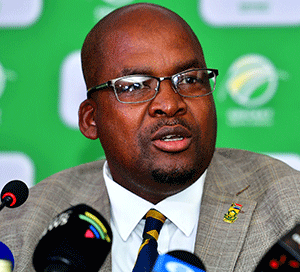South Africa is mid-table in the second division of world cricket. The way back to the top, a decade after first properly occupying the summit, will be extremely difficult. But it is not impossible. Not yet.
The CSA Interim Board has rewritten the organisation’s constitution (MOI) to include a new board structure comprising a majority of independent directors and properly separating its powers from the old-school Members Council comprising the provincial presidents.
A Special General Meeting (SGM) will be called in the first week of March to approve the structure before an AGM in the first week of April to ratify it. Already there are rumblings from those who would prefer to disrupt the process.

In 2012 South Africa occupied a place right next to the ‘big three’ nations at the ICC’s top table. They earned that seat not by being good in the boardroom but by being the best team on the field. It is critical to the future survival of South Africa as a potent force in the world game that people remember that. And that it is explained to those who never understood it.
As distasteful and ‘old world’ as it may be, the reality of international cricket remains simple: Fixtures are decided by middle-aged (and old) men who trade ‘deals’ with each other. ‘Do us a favour and we’ll do you one. Add a couple of ODIs to this tour and we’ll play an extra Test match and three T20s when we come to you in two years’ time.’
‘Credibility’ and bargaining power around that negotiating table is either earned by years of service or by outstanding performances on the field. South Africa has neither at the moment. The only person people have heard of is CSA Director of Cricket, Graeme Smith, and they all know who he is.
Many of the game’s most powerful, global individuals have been attempting to contact the former captain in the absence of anybody else they have even heard of at CSA but Smith, rightly, has played no shots in reply. Except with the operating details of the scheduled Australian Test tour which fell directly in his ambit of responsibility. And he was as ruthless as he ever was with the bat. Cricket Australia were appalling, and he has said so.
Smith has just turned 40 and is still learning as an administrator, but few people will ever have learned faster on the job. He is certainly not ‘ready’, in the conventional sense, to be appointed as the desperately needed new CEO of CSA, but whoever does get the job will be making a grave error if they do not capitalise on the gravitas he brings.
And the money. Whether pandemic logistics allow the tours to happen or not, Smith’s relationship with one-time opposing captain and current BCCI president, Saurav Ganguly, will see the Proteas visit India for three ODIs and India make a flying visit to SA for three T20s in the next 3-4 months, worth almost R200 million to CSA. The value of relationships.
Approval and ratification of the new CSA structure will, naturally, not be straightforward because it provides an opportunity for the game’s smallest and least significant parties to heckle and protest. It has already begun.
Even if, and when, the modernised administration is approved, the trust that an independent board will revolutionise outdated and amateurish ideologies may be forlorn.
‘Independent’ has historically meant a period of three years without a tangible provincial affiliation. Three years is barely a heartbeat. If there is a clammer of the same old names and faces competing for a place on the new board, CSA will not just be in the same old place. It will be in an irretrievable hole.
“There is still a place for respect and empathy amongst the Test nations, but I reckon it has to start at home,” a former player-turned administrator from elsewhere told me this week. “Frankly, it’s embarrassing for everyone when a country’s board (CSA) holds a two-year bitch-fight with dirty laundry on full display. Most families walk away from that. With no AB, Hashim, Dale Steyn etc, they are nobody on the field and even less off it.”
A fascinating book about survival from the most extreme of circumstances by Laurence Gonzales suggests a common theme amongst individuals and groups who have prevailed against the most extreme odds.
It is the recognition and acceptance that the odds for survival are outweighed by death. Only when they embraced the finality of their predicament could they move to prevent it. Having accepted their reality, shark attack victims, those cast adrift at sea and the man who cut his own hand off with a blunt penknife trapped by a boulder in a mountain ravine, could do the necessary.
Perhaps the reality is too stark, and the glory years still too close. But while South Africa’s ‘cricket people’ continue to squabble for petty, personal gain, the whole ship will sink. They will ask, in years to come, how it happened. Now is the time to ask.
If you enjoy my journalism, there are a couple of ways you can show your appreciation. I am entirely freelance but have no intention of going down the ‘paid subscription’ route.
You can Buy Me a Coffee. You can buy several coffees if you like (simply change the number of coffees to your preferred amount). Or, you can also donate here if you prefer not to use PayPal.
Alternatively, please encourage anyone you think may be interested to subscribe.
Of course, you are welcome to continue reading for free.




Hi Manners, thanks again for a very well written and insightful article. What a sad state of affairs at CSA caused by inept, self centered out of touch "administrators". Unfortunately, given the ever increasing "transformation" narrative permeating all sectors of South African society (including team selections), I cannot see any light at the end of the tunnel. Perhaps they should start arranging fixtures with Zimbabwe and Kenya.
Kind regards
Bryan
Hi Manners,
Thanks for your forthright comments, much appreciated.
I have a major concern that we still have not recognized to the full extent that a sound functioning boardroom is as important as performance on the field. In fact, a weak or incompetent boardroom will over time cause poor performances on the field. The West Indies are a prime example and now South Africa epitomizes the connection between boardroom competence and performance on the field.
The danger is that outstanding performances on the field eg when Graeme Smith was skipper, can camouflage an increasingly incompetent boardroom. The warning signs were there after Ali Bacher's heyday, showed promise when Haroon Lorgat took over at the helm and since then effectiveness has nose-dived despite the best efforts from some well-intentioned individuals.
To me, the message is clear. Insist on highly competent superb professionals in the boardroom dedicated to serving South African cricket. not their own egos. And don't succumb to a gender split. If the best are women, appoint them. If the best are men, appoint them. Maggie Thatcher, was the UK's best prime minister in the 20th century. a competent professional . . . .and a woman !!
Best wishes,
Ron Hurt